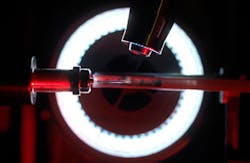British scientists discover way to fight antibiotic-resistant bacteria
Antibiotic-resistant bacteria represent one of the most serious challenges faced by global healthcare authorities. Thanks to a new study by researchers at the University of East Anglia (UEA), the fight against them may become easier.
Scientists at UEA have discovered what might be the Achilles' heel of antibiotic resistance, revealing a weak spot in the barrier that encompasses bacterial cells resistant to drugs. According to a statement published on UEA's website, the discovery could lead to a new generation of drugs that will eliminate super-bugs by destroying their defensive barrier, rather than the bacteria.
For their study, the team of researchers focused on a class of bacteria known as "Gram-negative bacteria," which is considered to be the most resistant to drugs, due to its practically impermeable outer membrane formed of lipids. It prevents the cell from attacks coming from the human immune system, as well as from antibiotic drugs, so removing that barrier would result in the bacteria becoming vulnerable. The latest discovery actually reveals more about the mechanism in which the defensive membrane is built, potentially finding a way to destroy it using new drugs, researchers explained.
Prof. Changjiang Dong, from UEA's Norwich Medical School and leader of the project, commented that the discovery was very important because it could prevent the further rise of super-bugs and the deadly development of antibiotic-resistant infections.
